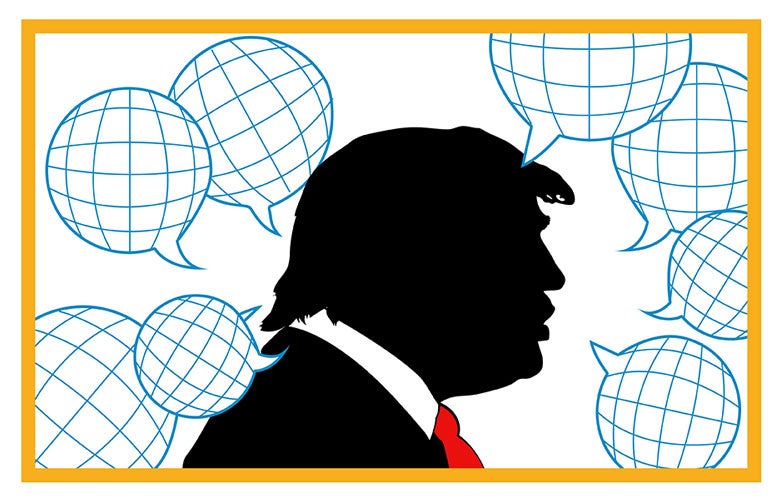In the wake of the election of Donald Trump as U.S. president in November, the World Politics Review (WPR) team and our expert contributors have been working overtime to make sense of what a Trump presidency will mean for U.S. foreign policy and the world at large.
In the weeks since the election, we’ve already published a number of articles on the implications of the election (our Trump coverage is and will continue to be aggregated on the WPR website), and one word keeps popping up over and over again: uncertainty.
Because Trump’s specific foreign policy proposals in the campaign tended toward the vague; because he has displayed a willingness to change his views, often erratically; and because we do not yet know what his team and governing style will look like, uncertainty is the order of the day. Such uncertainty can have costs for international relations if it is allowed to linger, World Politics Review Editor-in-Chief Judah Grunstein wrote about this issue the morning after the election.
"Although Trump has vaunted unpredictability in the context of conflict and hostile negotiations, the U.S. position is often a key determinant for third parties even in negotiations where the U.S. is not necessarily at the table. Having relatively clear parameters for understanding Washington’s preferences and red lines informs decision-making in foreign capitals not only in times of crisis, but on a day-to-day basis. Removing that benchmark reference means everyone is flying blindly, using instruments they can no longer be sure are calibrated correctly.
Think of it as the geopolitical equivalent of a currency that, after years of being pegged, is suddenly allowed to float. Everyone knows that, after the initial turbulence and volatility, its value will settle. The crux of the matter is where. In this case, given America’s central role in backstopping the global order, the analogy would be to a reserve currency whose value is suddenly upended. There is not a country in the world whose accounting ledgers are not affected. All are wondering what a Trump presidency means—for their country, their region and the world. And the truth is, no one really knows."
That no one yet knows for sure what a Trump presidency means, however, does not mean informed analyses of the possibilities and probabilities cannot be made. Last week, for example, World Politics Review columnist Ellen Laipson looked at the big picture, examining how a Trump administration will deal with what she considers to be the top three threats to international security: climate change, nuclear proliferation and terrorism. “On terrorism and preventing the spread of nuclear weapons, the changes may be more rhetorical than real,” Laipson wrote. However, on climate change, Laipson sees the possibility of significant consequences:
"Judging from early indications, Trump will be advised by climate change skeptics, and there is reason to believe he will be cavalier about the value and importance of international cooperation to set standards for emissions, and skeptical about the need for measurable changes in human activity that have contributed to global warming. Many worry about the various ways he can do damage, whether by executive orders canceling Obama’s commitments, or by new measures ratcheting up traditional energy industries that would put the U.S. out of compliance with the Paris agreement.
A more relaxed American attitude to climate change could lead to other countries assuming a more prominent leadership role. While there may be some advantages to having other countries take more responsibility for advancing international cooperation, it’s more likely that absent American leadership, there will simply be less political focus and less political will to tackle this existential issue. An unraveling of the carefully built consensus on climate action could well be the most dangerous long-term outcome of the Trump presidency."
In another article we published in November, Tom Kutsch agreed that a Trump presidency will constitute a major roadblock to the international process to fight climate change.
In addition to taking in the 30,000-foot view, WPR analysts are also getting down in the weeds, looking at the very specific ways a Trump administration may affect particular areas of the world. Matthew Rojansky looked at what was a hot-button issue during the campaign: Trump’s likely posture toward Russia. Rojansky sees Trump bringing to Washington “a new enthusiasm for direct dialogue and possible cooperation with Russia,” but sees considerable structural and political constraints to major breakthroughs on disputes over Syria, Ukraine, NATO and other issues.
We’ve also looked at the implications of a Trump presidency for Egypt, Cuba and the United Nations. Other big-picture issues that we’ve covered in the context of the election’s outcome include U.S. national security policy, the rise of global populism, the fate of the liberal international order, and what the recent history of Latin America could teach us about the United States under Trump.
World Politics Review is committed to helping our readers make sense of the international implications of the next presidential administration, and our extensive coverage since the election demonstrates the value of our approach, which is a wide and deep examination of all of the myriad issues at play.
If you think your faculty and students could benefit from the kind of coverage World Politics Review provides, I invite you to request a free trial by clicking the button below.
EBSCO does not endorse or oppose any political view, party or candidate. By providing information resources such as World Politics Review and other databases, and political magazines such as The Nation, National Review and New Republic through Flipster, EBSCO seeks to give researchers access to a wide-range of ideas and viewpoints.



